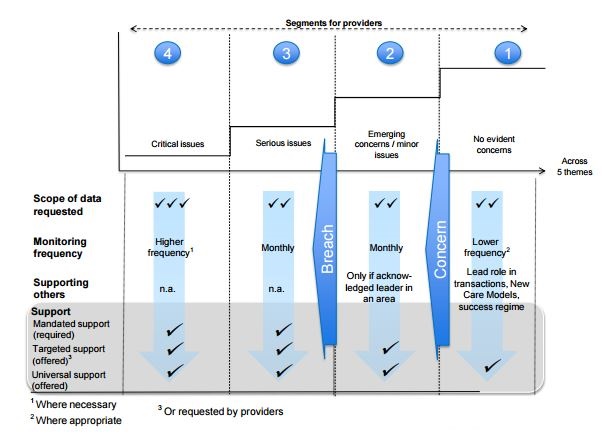29.06.16
New oversight framework must judge all trusts 'objectively' on 'clear criteria'
NHS Providers have said that the new single oversight framework proposed by NHS Improvement offers “real potential”, but must ensure all trusts are judged “objectively against clear criteria”.
The new framework is set to replace Monitor’s risk assessment framework and TDA’s accountability framework, and is designed to help identify the support needs of both NHS trusts and foundation trusts.
NHS Improvement has launched a consultation into the proposed framework, which will help identify where providers may benefit from improvement across five areas: quality of care; finance and use of resources; operational performance; strategic change; and leadership and improvement capability.
The regulator said that by focusing on these five themes, which are linked to the CQC’s key questions, but are not identical, will support providers to improve to attain and/or maintain a CQC ‘good’ or ‘outstanding’ rating.
Lord Carter’s productivity and performance review recommended the development of an integrated performance framework, fully incorporating the CQC’s five existing reporting areas. NHS Improvement added that it will continue to “work with CQC to align our approaches more fully as we move towards a single combined assessment of quality and use of resources”. It added that it welcomes views on this as part of the consultation.
Jim Mackey, CEO of NHS Improvement, said: “The framework we are consulting on will shift the emphasis away from regulation and performance management and towards identifying how we can best help providers make the improvements they want to make for patients.
“Given the challenges the NHS faces, it is important that all national bodies work together – which is why we’ve been working alongside the CQC and NHS England in developing this framework.”
Segmentation
As part of the framework, the regulator has proposed to segment the provider sector according to the scale of issues faced by individual providers. This will be informed by data monitoring and, importantly, judgement based on an understanding of providers’ circumstances. But it added that segmentation “does not in itself constitute an assessment of provider performance”.
The segment a provider is placed in will reflect the “seriousness and complexity of the issues it faces”, and will be based on considering all available information on providers – both obtained directly and from third parties; identifying those providers with one or more triggers of potential concern; and using NHS Improvement’s judgement, based on relationship knowledge and/or the findings of formal or informal investigations, consideration of the scale of the issues faced by a provider and whether it is in breach or suspected breach of licence conditions.
Providers will then be segmented as follows:
Segment 1: No potential concerns identified
Segment 2: Provider not in breach but still triggering a potential concern
Segment 3 or 4: Provider in licence breach (or equivalent for NHS trusts)

The regulator added that segmentation needs to be “as timely and rigorous as possible”, without becoming a bureaucratic or complex process. NHS Improvement plans to carry out a segmentation exercise before going live with the new framework, identifying which segment a provider is in at the time the framework goes live.
Clarity needed
It was noted that the statutory obligations of Monitor and TDA continue within NHS Improvement. Therefore, NHS Improvement must ensure the operation of a licensing regime over all eligible NHS providers.
Miriam Deakin, head of policy at NHS Providers, said: “NHS Improvement’s new single oversight framework is significant for all NHS providers. It marks a shift in the new organisation’s approach by introducing one integrated framework for NHS trusts and foundations trusts and offers real potential to align regulation with the CQC, and to ignite and support a movement of sector led improvement.
“The operation of the new framework will be central in maintaining NHS Improvement’s reputation with the sector, and in building trust in the objectivity and consistency of its judgements. We welcome the greater emphasis on improvement and tailored and voluntary support however, it is important that all trusts are judged objectively against clear criteria and we are keen to follow how the statutory duties of Monitor and the TDA translate into practice in this fresh approach.
“NHS Providers will work closely with its members to make a full response to the consultation – and with NHS Improvement to ensure that the new approach marks a helpful step forwards in the nature of regulation and support.”
The consultation will last for six weeks and NHS Improvement will be running engagement events across England to seek views from across the NHS. To take part in the consultation, click here.